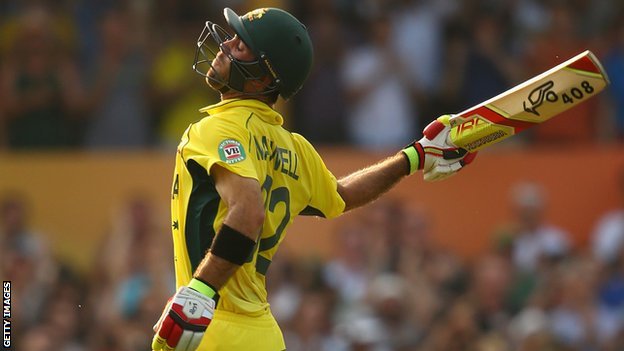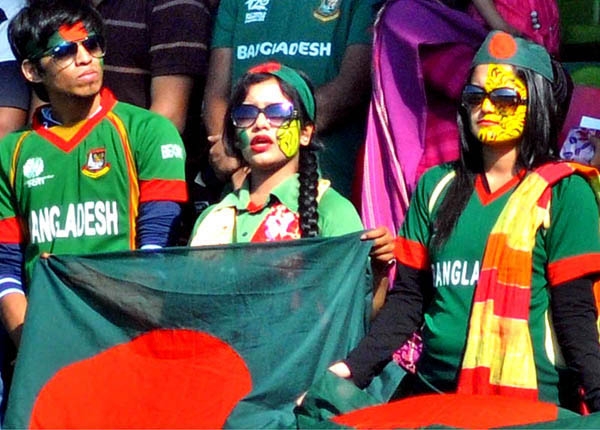![_81479655_465563810-1[1]](http://black-iz.com/wp/wp-content/uploads/2015/03/81479655_465563810-11-300x169.jpg)
Glenn Maxwell
hit the second-fastest century in World Cup history as Australia beat Sri Lanka by 64 runs to advance to the quarter-finals.
Maxwell’s first one-day international ton, reached off 51 balls, inspired Australia’s total of 376-9 in Sydney.
Sri Lanka fell short in a spirited run chase despite a third consecutive World Cup century from Kumar Sangakkara and a quickfire 52 from Dinesh Chandimal.
Australia are likely to meet either Ireland or Pakistan in the last eight.
Michael Clarke’s side, who face Scotland in their final Pool A match in Hobart on 14 March, should finish second behind New Zealand in their group, and would therefore meet the team that finishes third in Pool B.
Sri Lanka, who lie in third place in the group with six points from their five matches, also face Scotland in their final Pool A match in Hobart on 11 March.
Maxwell hit 10 fours and four sixes in an innings of 102 that combined deft placement with power hitting, as the 26-year-old finally reached three figures in his 45th ODI.
He was denied a share of the fastest World Cup century arguably only by his own honesty, after he answered in the negative when asked by umpire Ian Gould whether he had got a touch on a legside glance off Lasith Malinga in the 45th over.
Maxwell bought up his hundred in the next over, off 51 deliveries, one more than it took Ireland batsman Kevin O’Brien to decimate the England attack in Bangalore in 2011. However, it is the fastest ODI century by an Australian, beating James Faulkner’s 57-ball century against India in 2013.
The Victorian received a bear-hug from batting partner Shane Watson, who hit 67 runs in 41 balls on his return to the side after being dropped for the previous match against Afghanistan.
“I didn’t know about the record World Cup century, but I knew about the Australian record because James Faulkner doesn’t shut up about it!” Maxwell said.
Steve Smith (68) and captain Michael Clarke (72) had earlier laid the platform for a huge Australia total with a 134-run stand for the second wicket in 23.1 overs.
Tillakaratne Dilshan set the tone for the Sri Lanka reply by hitting Mitchell Johnson for six consecutive fours off the fifth over, much to the Australia fast bowler’s incredulity, as he and Sangakkara, a batting duo with a combined age of 75, put on 130 for the second wicket.
Sri Lanka were always struggling to keep on top of the rate, particularly after Australia captain Clarke broke a dangerous third-wicket partnership with a direct hit from mid-off to account for Mahela Jayawardene (19) in the 31st over.
Sangakkara completed a third consecutive century in this tournament, a World Cup first, and his sixth hundred in his last 11 ODIs, but his dismissal to James Faulkner in the 34th over left Sri Lanka still needing 176 from 97 balls.
Chandimal hit a lusty 24-ball 52 after Sangakkara’s dismissal to keep Sri Lanka’s slim hopes alive, but his exit retired hurt in the 42nd over effectively spelled the end of the unlikely run chase.
Clarke was pleased that his bowlers did not panic when Dilshan, Sangakkara and then Chandimal began to score freely in the Sri Lanka response.
“If we can hold our nerve like that we give ourselves a chance. Watching players around the world scoring so quickly and freely, teams can chase any score now,” he said.
Sri Lanka captain Angelo Mathews believes his side would have been well in the game if his bowlers had been able to check the scoring in the final overs of the Australia innings.
“We conceded 200 runs in the last 16 overs and it was way too much – 340 would have been a real good chase,” he admitted.




